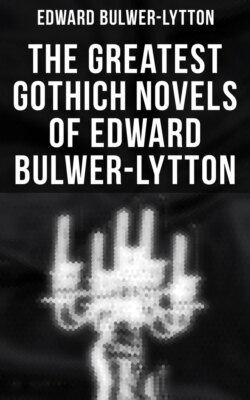Читать книгу The Greatest Gothich Novels of Edward Bulwer-Lytton - Эдвард Бульвер-Литтон - Страница 64
На сайте Литреса книга снята с продажи.
CHAPTER 5.VI.
ОглавлениеTable of Contents
La loi, dont le regne vous epouvante, a son glaive leve sur vous:
elle vous frappera tous: le genre humain a besoin de cet
exemple.—Couthon.
(The law, whose reign terrifies you, has its sword raised against
you; it will strike you all: humanity has need of this example.)
“Oh, joy, joy!—thou art come again! This is thy hand—these thy lips. Say that thou didst not desert me from the love of another; say it again—say it ever!—and I will pardon thee all the rest!”
“So thou hast mourned for me?”
“Mourned!—and thou wert cruel enough to leave me gold; there it is—there, untouched!”
“Poor child of Nature! how, then, in this strange town of Marseilles, hast thou found bread and shelter?”
“Honestly, soul of my soul! honestly, but yet by the face thou didst once think so fair; thinkest thou THAT now?”
“Yes, Fillide, more fair than ever. But what meanest thou?”
“There is a painter here—a great man, one of their great men at Paris, I know not what they call them; but he rules over all here—life and death; and he has paid me largely but to sit for my portrait. It is for a picture to be given to the Nation, for he paints only for glory. Think of thy Fillide’s renown!” And the girl’s wild eyes sparkled; her vanity was roused. “And he would have married me if I would!—divorced his wife to marry me! But I waited for thee, ungrateful!”
A knock at the door was heard—a man entered.
“Nicot!”
“Ah, Glyndon!—hum!—welcome! What! thou art twice my rival! But Jean Nicot bears no malice. Virtue is my dream—my country, my mistress. Serve my country, citizen; and I forgive thee the preference of beauty. Ca ira! ca ira!”
But as the painter spoke, it hymned, it rolled through the streets—the fiery song of the Marseillaise! There was a crowd, a multitude, a people up, abroad, with colours and arms, enthusiasm and song—with song, with enthusiasm, with colours and arms! And who could guess that that martial movement was one, not of war, but massacre—Frenchmen against Frenchmen? For there are two parties in Marseilles—and ample work for Jourdan Coupe-tete! But this, the Englishman, just arrived, a stranger to all factions, did not as yet comprehend. He comprehended nothing but the song, the enthusiasm, the arms, and the colours that lifted to the sun the glorious lie, “Le peuple Francais, debout contre les tyrans!” (Up, Frenchmen, against tyrants!)
The dark brow of the wretched wanderer grew animated; he gazed from the window on the throng that marched below, beneath their waving Oriflamme. They shouted as they beheld the patriot Nicot, the friend of Liberty and relentless Hebert, by the stranger’s side, at the casement.
“Ay, shout again!” cried the painter—“shout for the brave Englishman who abjures his Pitts and his Coburgs to be a citizen of Liberty and France!”
A thousand voices rent the air, and the hymn of the Marseillaise rose in majesty again.
“Well, and if it be among these high hopes and this brave people that the phantom is to vanish, and the cure to come!” muttered Glyndon; and he thought he felt again the elixir sparkling through his veins.
“Thou shalt be one of the Convention with Paine and Clootz—I will manage it all for thee!” cried Nicot, slapping him on the shoulder: “and Paris—”
“Ah, if I could but see Paris!” cried Fillide, in her joyous voice. Joyous! the whole time, the town, the air—save where, unheard, rose the cry of agony and the yell of murder—were joy! Sleep unhaunting in thy grave, cold Adela. Joy, joy! In the Jubilee of Humanity all private griefs should cease! Behold, wild mariner, the vast whirlpool draws thee to its stormy bosom! There the individual is not. All things are of the whole! Open thy gates, fair Paris, for the stranger-citizen! Receive in your ranks, O meek Republicans, the new champion of liberty, of reason, of mankind! “Mejnour is right; it was in virtue, in valour, in glorious struggle for the human race, that the spectre was to shrink to her kindred darkness.”
And Nicot’s shrill voice praised him; and lean Robespierre—“Flambeau, colonne, pierre angulaire de l’edifice de la Republique!” (“The light, column, and keystone of the Republic.”—“Lettre du Citoyen P—; Papiers inedits trouves chez Robespierre,” tom 11, page 127.)—smiled ominously on him from his bloodshot eyes; and Fillide clasped him with passionate arms to her tender breast. And at his up-rising and down-sitting, at board and in bed, though he saw it not, the Nameless One guided him with the demon eyes to the sea whose waves were gore.
